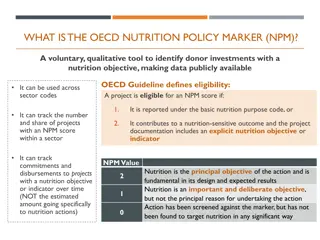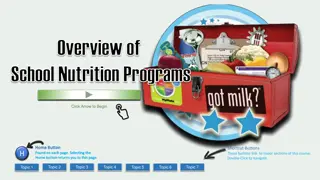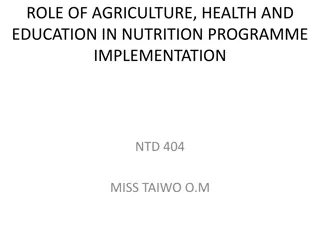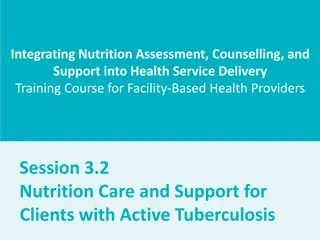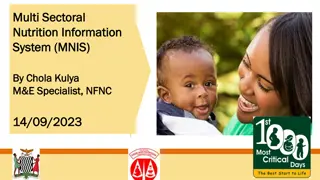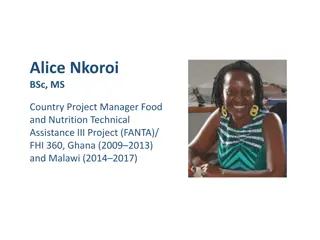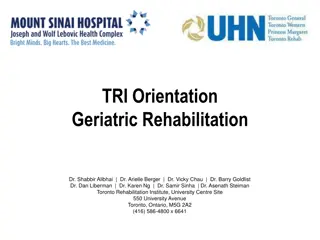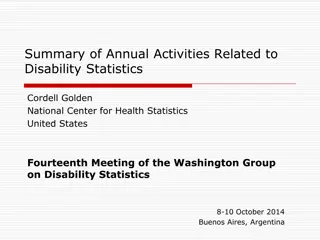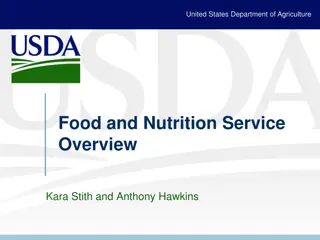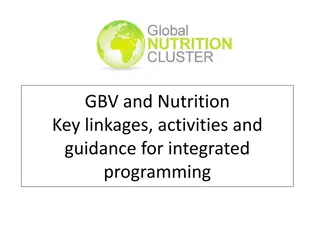Understanding Disability and Nutrition Programs for Children with Special Needs
This informative content covers topics such as accommodating children with disabilities in nutrition programs, guidance for school food service professionals, definition of disability, major life activities, and the importance of obtaining written medical statements for meal modifications. It emphasizes the need for proper documentation and understanding of children's physical and mental impairments to ensure appropriate accommodations in school meal programs.
Download Presentation

Please find below an Image/Link to download the presentation.
The content on the website is provided AS IS for your information and personal use only. It may not be sold, licensed, or shared on other websites without obtaining consent from the author. Download presentation by click this link. If you encounter any issues during the download, it is possible that the publisher has removed the file from their server.
E N D
Presentation Transcript
Accommodating Children with Disabilities CHILD NUTRITION PROGRAM
Guidance for School Food Service Professionals National School Lunch Program School Breakfast Program Special Milk Program Afterschool Snack Program Fresh Fruit Vegetable Program
DISABILITY Disability means a physical or mental impairment that substantially limits one or more major life activities of such individual Physical or mental impairments do not need to be life threatening to constitute a disability Disability can be temporary and episodic and when it is active may limit major life activity Health concerns or preferences that a child eat a specific diet because the parent/guardian believes it is healthier for the child are not disabilities and do not require a modification.
MAJOR LIFE ACTIVITIES Major Life Activities Caring for oneself Major Bodily Functions Functions of the immune system Performing manual tasks Normal Cell Growth Seeing, hearing, speaking Digestive, Bowel, Bladder Eating, Sleeping, Walking Neurological, brain Standing Respiratory Lifting, Bending Circulatory Breathing Endocrine Reading, Learning, Thinking Reproductive Communicating Working
MEDICAL STATEMENTS SFAs must obtain a written medical statement signed by a State licensed health care professional in order to receive reimbursement for meal modifications when the meal modification does not meet meal pattern requirements. The medical statements do not need to be received on a regular basis The medical statement needs to be on file and updated as needed Departmental regulations require recipients to notify participants, beneficiaries, and applicants that they do not discriminate on the basis of disability and to identify the individual responsible for providing the modification
MEDICAL STATEMENTS Medical statements must include: Information about the child s physical or mental impairment that is sufficient to allow the SFA to understand how it restricts the diet Explanation of what must be done to accommodate the child s disability Food or foods to be omitted and recommended alternatives If the medical statement is not detailed enough, SFAs should contact the parent or guardian for guidance
Food Allergies 90% of all food-based allergic reactions are from: Peanuts Milk Eggs Wheat Soy Tree Nuts(Almonds, Pecans, or Walnuts) Fish Crustacean Shellfish(Crab, Lobster, or Shrimp)
Food Service Role Tracking Dietary Intake Food Safety/Sanitation
Special Circumstances Portion Sizes Brand Name Requests Offer vs. Serve Procurement of Special Meals
Fluid Milk Substitute Nutrient Requirements Nutrient 8 Fluid Ounces Calcium Protein Vitamin A Vitamin D Magnesium Phosphorus Potassium Riboflavin Vitamin B-12 276 mg 8 g 500 IU 100 IU 24 mg 222 mg 349 mg 0.44 mg 1.1 mcg
Procedural Safeguards and Training SFAs must have a procedure in place to ensure parents know how to request a meal modification and how to file an grievance if a requested modification is not granted Must include: How to file a grievance Receive a prompt and equitable resolution Request and participate in an impartial hearing to resolve the grievance Must be represented by counsel at the hearing Examine the record Receive notice of the final decision and procedure for review
Resources http://www.fns.usda.gov/policy-memorandum-modifications- accomodate disabilities-school-meal-programs. SP 26-2017: Accommodating Disabilities in the School Meal Programs: Guidance and Questions and Answers (Q and As) http://www.fns.usda.gov/school-meals/accommodating-disabilities- school-meal-programs-guidance-and-qas.
Child Nutrition Program Administration (518) 473-8781 cn.nysed.gov cntraining@nysed.gov







